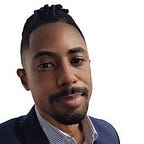Growing Apart From and Into My Father
The best therapist I ever had was an older white man my father’s age. “Who was your father before he was your father?” is the breakthrough he led me to. He helped me realize my father was a person with a past that preceded me. Contemplating the many pre-fatherhood dynamics, experiences, and interactions that molded my father helped me see all that I didn’t like about him, in a different light, through a more informed lens, with more compassion and context. It helped me forgive.
Before I left Texas for college in Boston, my dad searched Marshall’s and Ross Dress for Less high and low for a set of big, durable suitcases that would last me all 4 years. When he finally settled on the perfect set, he unfortunately realized from the tag that several of the 6 pieces were missing. Yet, instead of taking from another set, he searched nearly 10 other stores for the rest, until he found each piece.
Years later, he shared that he felt so out-of-place and self-conscious when he arrived to college with his belongings in blankets, milk crates, plastic sacks, and trash bags. His lack of preparation, in part, was attributable to the fact that despite him being the salutatorian and Vice President of his senior class, not a single counselor or teacher encouraged him to apply for scholarships, or even to apply to college at all. He signed up for college on a whim, barely making the deadline, after his cousin, the valedictorian of the previous graduating class, convinced him to just try a semester with her.
The other part of higher education that I believe scarred my father was the lack of mentorship programs for first-generation college students back then, especially Black students. It was sink or swim. So, my father’s parenting focused on ensuring that I would effortlessly assimilate into a world to which he adjusted through trial and error, and sometimes awkwardness and faux pas. He made it his mission to equip me with all of the cultural capital, social etiquette, and upper-middle-class values to which he was never exposed, until only after a slip-up revealed how sheltered or “unpolished” he seemed, in comparison to the many kids with generational status and wealth.
The fear of me reliving his mistakes sometimes meant that he pushed me relentlessly, especially at any sign of complacency or self-doubt. White teachers often replied to my dad’s notes with, “A B is great, and you should be proud of Jeffrey.” He never budged one bit. “As requested, please attach extra practice problems to this note, and send home with Jeffrey. Thanks.” If preventing them from standing in my way meant appearing confrontational or overbearing, so be it.
It didn’t always feel like protecting me, though. It often felt like control and pressure, especially since by nature, I experiment with trying things my own way first. A fundamental difference between us is that the traditional, tried-and-true paths to fulfillment and success have always been my last resort, mainly because giving me the life he never had resulted in my early awareness of the charade of assimilation.
Ironically, while attending what many would consider to be the most diverse high school in Houston––a city which has been ranked the nation’s most diverse, multiple times––my peers taught me how pervasive anti-Blackness is; how hard some non-Black people work to humble Black people who strive to be and have more. By 15, I already understood that no amount of “there’s only one human race” colorblindness, conformity, respectability, self-repression, or grit, can help you transcend forms of institutional racism and white supremacy that, by design, erect barriers and glass ceilings.
It’s taken my father a while to realize the courage and power in my approach of flipping over the table, instead of vying for a seat at the table. Everything that my dad naively had blind faith in throughout his life — the Bible, the Church, corporate America, patriarchy, professionalism, the white gaze — I have critiqued pointedly, without sparing his feelings. There have been so many arguments, and actual fights, that felt like father-son clashes during scenes from The Butler.
To this day, Curtis Mayfield’s “Move On Up” reminds me of my father, and a whole generation of Black folks who placed so much hope in integration.
But now, after I have forged my own path, I think he finally gets that we are on the same page; that I am actually fighting for his younger self in ways he didn’t know how; that I am of a generation that has the privilege to fight for more than just myself. Not too long ago, he made an affirming comment along the lines of him being glad to see me push this society forward, and that given the foundation I had, I have the obligation to shake things up and take bolder risks than he did. That meant so much.
My father and I are simultaneously different and similar, with the main similarity being our persistence in pursuing the visions we see for our lives, however divergent they have been. You don’t control or suppress us without catching smoke. I’m just a little louder about it than he ever imagined. But that also means I can and will go as hard for him as he has for me. When you look at it that way, we are one and the same.
Everything I’ve accomplished, my dad has remarked, “Oh––I already knew you could. I’ve always known what you were capable of. I’ve always known your potential. I was waiting for you to see it.”
